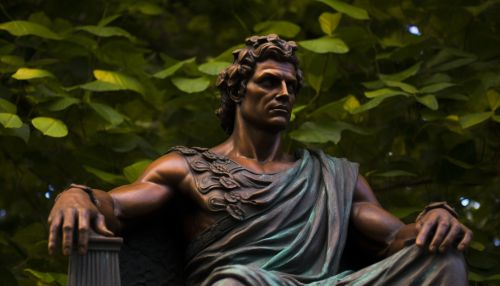Seneca the Younger
Early Life
Seneca the Younger, also known as Lucius Annaeus Seneca, was born in Cordoba, Spain, around 4 BC. He was the second son of Helvia and Marcus Annaeus Seneca, a wealthy rhetorician and writer. His family moved to Rome during his childhood, where he was educated in philosophy and rhetoric.
Education and Career
Seneca was introduced to Stoic philosophy at a young age and became a dedicated follower. He studied under the tutelage of the renowned Stoic philosopher Attalus and the Epicurean philosopher Sotion. His philosophical studies were interrupted when he was sent to Egypt for health reasons around 31 AD. He returned to Rome in 37 AD and entered the political arena.
Seneca embarked on a successful career in politics, serving in the Senate and achieving the rank of quaestor under Emperor Caligula. Despite the volatile nature of Caligula's reign, Seneca managed to navigate the political landscape effectively. He was later accused of adultery with Caligula's sister Julia Livilla and was exiled to the island of Corsica in 41 AD by Caligula's successor, Claudius.
In 49 AD, Seneca was recalled from exile by Agrippina, Claudius' wife, to become the tutor of her son, the future Emperor Nero. Seneca's influence over Nero was significant during the early years of his reign, and he was effectively Nero's chief advisor until 62 AD.


Philosophical Works
Seneca's philosophical works are primarily grounded in Stoicism, although they also incorporate elements of other philosophical schools. His writings are characterized by their practical approach to philosophy and their focus on ethics.
His most famous works include the "Moral Letters to Lucilius" (Epistulae Morales ad Lucilium), a collection of 124 letters discussing moral philosophy, and "On the Shortness of Life" (De Brevitate Vitae), an essay that encourages readers to focus on what is important in life and not waste time on trivial pursuits.
Seneca's other notable works include "On Anger" (De Ira), "On the Happy Life" (De Vita Beata), and "On the Tranquillity of the Mind" (De Tranquillitate Animi). His works have had a lasting impact on Western philosophy and continue to be studied and admired for their wisdom and insight.
Later Life and Death
Seneca retired from public life in 62 AD, but his retirement was marred by accusations of conspiracy against Nero. In 65 AD, he was accused of involvement in the Pisonian conspiracy, a plot to assassinate Nero. Although there is no conclusive evidence of his involvement, Seneca was ordered to commit suicide by Nero.
Seneca's death was reportedly calm and composed, reflecting his Stoic beliefs. He is said to have taken poison, but when that failed to kill him, he slit his wrists and ankles. His wife, Pompeia Paulina, attempted to die with him, but was prevented from doing so by Nero's soldiers.
Legacy
Seneca's philosophical works have had a profound influence on Western thought. His practical approach to Stoicism and his emphasis on ethical living have resonated with readers throughout the centuries. His writings have been admired by figures such as Montaigne, Erasmus, and John Calvin, and continue to be widely read and studied today.
